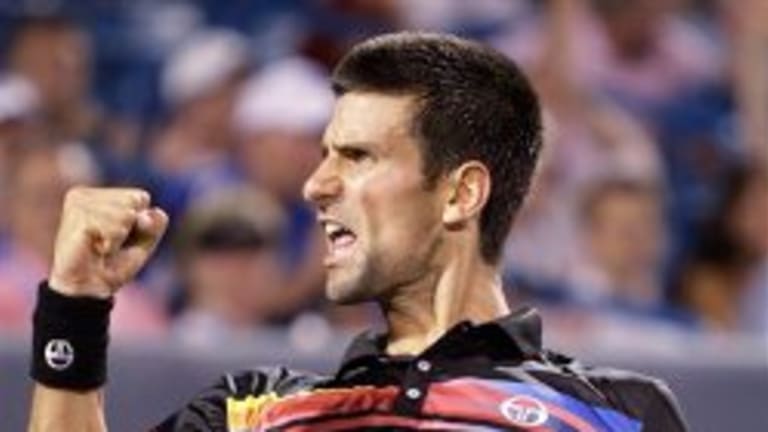How many Masters tournaments do I need to win this season? What's the difference, really, between 56-1 and 55-2? Didn't I just beat this guy 2 and 1 last week? Isn't it more important to rest for the U.S. Open? Haven't I done enough weekend interviews lately?
You could forgive Novak Djokovic if he was asking himself any of these questions after the first set of tonight's match with Gael Monfils, possibly the worst set of tennis he's played all year. The world No. 1 went 0-5 on break points, rushed his usually precise shots, lost his signature footwork and competed with a hangdog expression that said, I'd rather be anywhere but here. Patrick McEnroe called it "semi-tanking" in the ESPN2 broadcast booth, and anyone watching Djokovic at this point would have had to agree with that assessment.
On the other hand, Djokovic must have realized the incredibly rare and privileged position he found himself in: With one loss on his record through mid-August and a legitimate chance at compiling the greatest season of all time. By the third set of his 3-6, 6-4, 6-3 win over Monfils, Djokovic seemed to remember his status as the sport's unquestioned alpha male, reveling in yet another victory inside a packed stadium. But although Djokovic found a way to win when he wasn't at his best—the calling card of a great champion—Monfils' collapse, hardly a new phenomenon, deserves equal time.
The Frenchman left Djokovic reeling after the first set, but his ultimate test was actually finishing off the struggling Serb. Monfils was asked the question sooner than expected, as Djokovic ever-so gradually began to take an interest in the outcome. At 2-all, Monfils was broken, a double fault contributing to the slip-up. When Monfils broke back for 4-4, he had an opportunity to reestablish control—and give him credit, there was less showtime than usual tonight (and a lot more time winning points at net). Instead, he was broken right back, with another double fault giving Djokovic a 5-4 lead he wouldn't relinquish.
Monfils went from mental trouble to that of the physical variety in the decider. Broken in the opening game, Monfils, seemingly out of nowhere, looked like he could barely stand when Djokovic took the balls. He didn't retire, as I was half-expecting him to do, but Monfils lost the game in seconds and couldn't dig out of the break-of-serve hole. The sixth seed made Djokovic work for his final games, but in the end, winner's fatigue gave way to a familiar winner.
Djokovic's 56th victory of 2011 isn't likely to be revisited when we look back at his potentially historic campaign. But even though it wasn't against Rafael Nadal in a final, this was one of his toughest wins of the season, earned on a steamy night in Ohio with almost nothing, relatively speaking, to gain. Did you truly think Djokovic was in trouble? It doesn't matter; once again, Djokovic had the answers.
—Ed McGrogan
